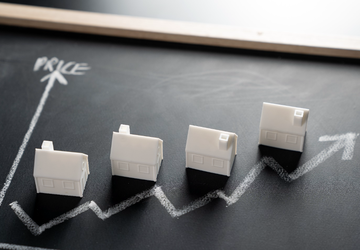The Impact of High Mortgage Rates on Housing Affordability
High mortgage rates significantly affect housing affordability by increasing the cost of borrowing, which results in higher monthly mortgage payments for homebuyers. This surge in payments reduces the buying power of potential homeowners, limiting their ability to purchase more expensive properties or larger homes. There is less demand for housing in the market as fewer people can afford to buy homes, which can slow down home sales and potentially lower home prices.
High mortgage rates significantly affect housing affordability by increasing the cost of borrowing, which results in higher monthly mortgage payments for homebuyers. This surge in payments reduces the buying power of potential homeowners, limiting their ability to purchase more expensive properties or larger homes. There is less demand for housing in the market as fewer people can afford to buy homes, which can slow down home sales and potentially lower home prices.
Recognizing Interest Rate Effects on Real Estate

Growing interest rates have a negative impact on mortgage affordability, which makes it more difficult for prospective homeowners to buy real estate. Families may find their monthly mortgage payments to increase significantly in response to even a slight mortgage payment increase. The demand for homes in the housing market will decline as a result, as fewer people are able to purchase them, which may slow down home sales and possibly lower home prices.
However, this potential price drop may not be enough to compensate for the higher costs associated with elevated mortgage rates. For existing homeowners, especially those with adjustable-rate mortgages, rising rates can lead to higher monthly payments, straining household finances. Additionally, as homeownership becomes less attainable, more people may turn to renting, increasing demand and potentially driving up rents in the rental market.
Potential slowdowns in related industries like construction and real estate are part of the overall economic impact, highlighting the broader implications of high mortgage rates on the housing sector and the economy. Here's how these rates affect the housing market and individuals:
1. Increased Monthly Payments
Higher mortgage rates directly lead to increased monthly mortgage payments. For homebuyers, this means a larger portion of their income must be allocated to housing costs, reducing homebuyer’s purchasing power.
2. Reduced Buying Power
As mortgage rates rise, the amount of loan that buyers can qualify for decreases. This limits the price range of homes they can afford, often pushing buyers towards less expensive properties or smaller homes.
3. Slower Housing Market
The housing market may slow down as a result of high mortgage rates. The demand for housing declines as fewer people are able to purchase homes, which could result in a drop in home prices.
However, this price drop may not always be enough to offset the higher costs associated with elevated mortgage rates.
4. Impact on Existing Homeowners
Homeowners with adjustable-rate mortgages may see their payments increase as rates rise. This can strain household budgets, particularly for those already on tight finances. Additionally, those looking to refinance may find less favorable terms, impacting their ability to lower monthly payments or access home equity.
5. Rental Market Effects
As buying a home becomes less affordable, more people may turn to renting, increasing demand in the rental market. This can lead to higher rents, further impacting overall housing affordability.
6. Economic Implications
High mortgage rates can also have broader economic implications. Reduced home sales can impact related industries, such as construction, home improvement, and real estate services, potentially slowing down economic growth.
7. Long-term Financial Planning
For individuals, high mortgage rates emphasize the importance of careful financial planning. Prospective homeowners should think about all of the costs involved in their mortgage, including interest payments over time, in addition to the purchase price.
8. Policy and Market Responses
Various measures may be implemented by governments and policymakers in response to high mortgage rates and their impact on the affordability of housing, such as adjusting interest rates, implementing housing assistance programs, or providing tax incentives for first-time homebuyers.

Strategies for Buying Real Estate in a High Mortgage Rate Environment
Buying a home in a high mortgage rate environment can be challenging, but there are strategies that prospective homeowners can use to manage costs and make a smart purchase. Here are some key strategies:
1. Increase Your Down Payment
A higher down payment lowers your total loan amount, which can result in lower monthly payments and possibly even a better interest rate. It also reduces the loan-to-value ratio, making you a more attractive borrower to lenders.
2. Explore Different Loan Types
Consider different mortgage options such as adjustable-rate mortgages (ARMs), which often have lower initial rates compared to fixed-rate mortgages. However, be aware that the rate can change after the initial period, potentially increasing your payments. It's important to evaluate the risks and benefits based on your financial situation and future plans.
3. Improve Your Credit Score
Even in a high-rate environment, you may be eligible for better interest rates if your credit score is higher. Before applying for a mortgage, take action to raise your credit score by paying off debts, fixing any mistakes on your credit report, and refraining from taking on new debt.
4. Shop Around for Lenders
Different lenders may offer different interest rates, so it's crucial to shop around and compare offers. Look at not just the interest rate, but also the terms, fees, and overall cost of the loan. If you're having trouble finding the best deal, think about working with a mortgage broker.
5. Negotiate Closing Costs
Closing costs can add up, but some of these costs may be negotiable. You can look around for less expensive service providers or ask the seller to pay a portion of these expenses. This may lower the final cost of buying a house.
6. Consider a Smaller or Less Expensive Home
In a high-rate environment, it may be more practical to look for a smaller or more affordable home. This can help you stay within your budget and manage higher interest costs.
7. Lock in Your Interest Rate
When you find a good rate, think about locking it in before closing to safeguard yourself against future rate increases. Rate locks typically last for a set period, so ensure it covers the time frame until your closing date.
8. Plan for Future Refinancing
If rates drop in the future, refinancing your mortgage could help lower your monthly payments. Watch changes in interest rates and take into account refinancing when it makes sense financially.
9. Build an Emergency Fund
Having a financial cushion can help you manage unexpected expenses and provide peace of mind if you face financial difficulties. This is particularly important in a high-rate environment where mortgage payments may take up a larger portion of your income.
10. Seek Professional Financial Advice
See a mortgage specialist or financial advisor to learn more about your options and help you make wise choices. They can help you navigate the complexities of buying a home in a high-rate environment and develop a plan that suits your financial situation.
Conclusion
High mortgage rates can create significant challenges for both prospective and current homeowners, affecting affordability, market dynamics, and overall financial well-being. When navigating these challenges, it's imperative that people stay informed and get professional financial advice.